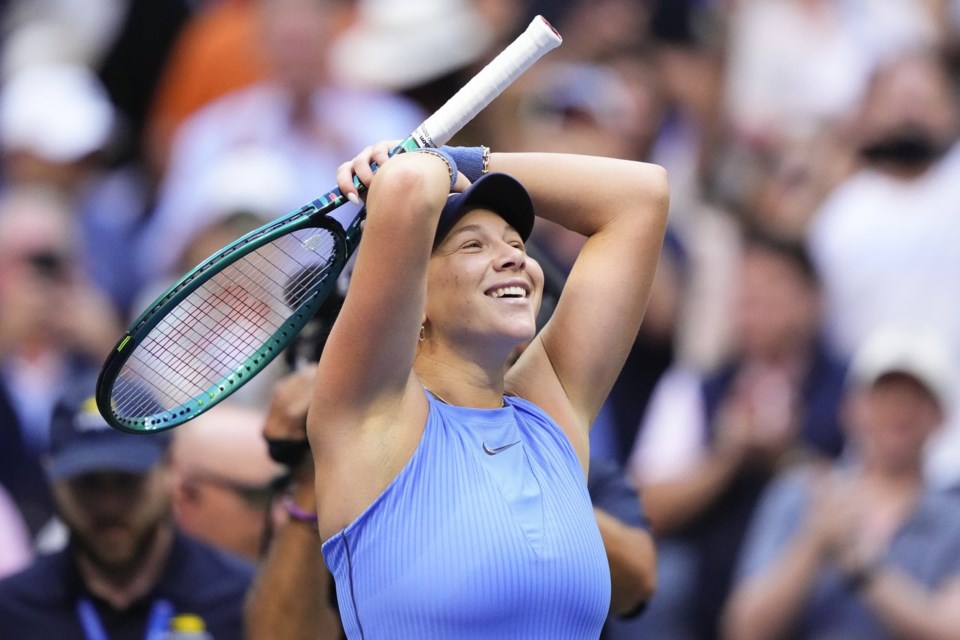NEW YORK (AP) — Amanda Anisimova upset Iga Swiatek 6-4, 6-3 in the U.S. Open quarterfinals Wednesday, less than two months after losing to the six-time Grand Slam champion in the Wimbledon final by a 6-0, 6-0 score.
The No. 8-seeded Anisimova reached her third major semifinal and first at Flushing Meadows.
“To come back from Wimbledon like that is really special to me,” said Anisimova, a 24-year-old who was born in New Jersey and grew up in Florida. “I feel like I worked so hard to try and turn around from that. ... Today is really special.”
The powerful strokes and poise she displayed in Arthur Ashe Stadium against No. 2 Swiatek — the 2022 U.S. Open champion — were such a striking contrast to what happened at the All England Club’s Centre Court on July 12.
That title match lasted just 57 minutes, and Anisimova only managed to win 24 points that day, a total she eclipsed about midway through the first set this time.
“Everybody knows how Amanda can play. Yeah, she didn’t play well in Wimbledon,” said Swiatek, a 24-year-old from Poland, “but it’s not like she’s always going to do the same mistakes or feel the same.”
Anisimova cried during her runner-up speech during the trophy ceremony at Wimbledon; on Wednesday, she was all smiles while addressing thousands of supportive spectators who kept interrupting her on-court interview with cheers.
“Playing here is so freaking special,” Anisimova told them, “and I've been having the run of my life here.”
On Thursday, Anisimova will try to reach a second consecutive major final. She’ll face four-time Grand Slam champion Naomi Osaka — who eliminated Coco Gauff on Monday — after the No. 23 seed beat No. 11 Karolina Muchova 6-4, 7-6 (3).
After one game against Swiatek in the quarterfinals Wednesday, Anisimova might have been forgiven for thinking, “Oh, no. Not this again.”
That's because Anisimova served first and got broken immediately when she lost three points in a row by missing forehands — one into the net, one wide, one long.
But Anisimova broke right back and soon was the one dictating points with her strong, flat groundstrokes that wound up contributing to 23 total winners, 10 more than Swiatek accumulated. Anisimova also played quite cleanly, making just 12 unforced errors.
“She moved better, she played better,” Swiatek said, comparing this match to the one at Wimbledon. “Everything was different.”
Swiatek's serve was problematic: She only put in 50% of her first serves and was broken four times.
“I couldn’t win today’s match playing like that, serving like that,” Swiatek said, “and with Amanda being so aggressive on the returns.”
In the second set, Anisimova fell behind early again, this time 2-0. But she again regrouped and quickly gained the upper hand. Swiatek was the one looking increasingly frustrated, shaking her head or slumping her shoulders between points, spreading her arms wide and looking to her coach for advice, and leaning back in her changeover chair as if pondering what, exactly, she could do differently.
When Swiatek double-faulted to trail 5-3 in the second set, that allowed Anisimova to serve out the victory.
“From the get-go, I was trying to fire myself up,” Anisimova said. “She is one of the toughest players I've ever played. I knew I was going to have to dig deep.”
___
More AP tennis: https://apnews.com/hub/tennis
Howard Fendrich, The Associated Press




